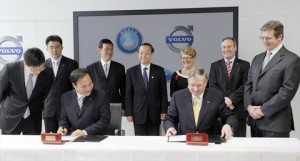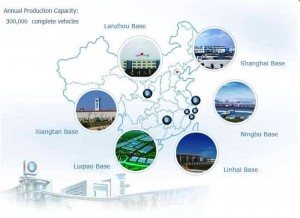Ford Motor Company today confirmed it has entered into a “definitive agreement” to sell Volvo Car Corporation and related assets to Zhejiang Geely Holding Group Company Limited.
The purchase price for Volvo Cars and related assets – mostly intellectual property – is $1.8 billion, which will be paid with a note for $200 million, and the balance in cash.
Thus ends what has turned out to be for Ford shareholders a very expensive foray into the Swedish car business, which started in 1999 when Ford bought Volvo for $6 billion. Billions more were then invested in the loss making company. Volvo sold about 334,000 cars globally in 2009, 22,000 in China, down from a record 460,000 in 1997.
Ford will not retain any ownership whatsoever in Volvo when the transaction is completed – from 100% to zero in a little more than a decade. Volvo was the last vestige of the now defunct Premier Automotive Group, which also included Aston Martin, Jaguar and Land Rover.
Ford said in a statement that the cash portion of the purchase price would be adjusted at the closing with modifications for pension deficits, debt, cash and working capital, the net effect of which “could be a significant decrease in the cash proceeds” to Ford.
The sale is expected to close in the third quarter of 2010, and is subject to the usual closing conditions, including the expected regulatory approvals.
“China, the largest car market in the world, will become Volvo’s second home market,” said Li Shufu, Chairman of Zhejiang Geely Holding Group. “Volvo will be uniquely-positioned as a world-leading premium brand, tapping into the opportunities in the fast-growing China market.”
Geely said it will “preserve Volvo Cars’ existing manufacturing facilities in Sweden and Belgium, while exploring opportunities to manufacture Volvo vehicles in new production facilities to be built in China for the local market.” While true in the short term, the long term prospects of expensive European plants remains uncertain.
Geely is headquartered in Hangzhou, the capital of Zhejiang province, and operates six car assembly and powertrain manufacturing plants in China, located in Lanzhou (Gansu province), Linhai (Zhejiang province), Luqiao (Zhejiang province), Ningbo (Zhejiang province), Shanghai and Xiangtan (Hunan province). These facilities have a production capacity of approximately 300,000 cars per year.
Following completion of the sale, Ford said it will continue to supply Volvo Cars with powertrains, stampings and other vehicle components for unspecified periods, presumably related to the cycle plan and future Volvo products that are nearing completion. This will give Geely time to work with Volvo on the next generation of products, and sort myriad supply chain issues.
“The Volvo management team fully endorses Ford’s sale of Volvo Cars to Geely,” said Stephen Odell, CEO of Volvo Cars, who has experience in Asia via Ford’s once controlling interest of Mazda. Mazda too has been largely sold off by Ford, from a controlling 33% to 11%, in its ongoing attempts to clean up its balance sheet without resorting to bankruptcy, the road taken by General Motors and Chrysler.
“We believe this is the right outcome for the business, and will provide Volvo Cars with the necessary resources, including the capital investment, to strengthen the business and to continue to move it forward in the future,” Odell claimed.



In fairness to both Ford and Volvo Cars, Volvo Car Coporation was profitable when Ford purchased it in 1999. And while the profitablity and value of Volvo Car Corporation dropped in the years since (along with the value of most other car companies), Ford did get the benefit of using Volvo architecture as the underpinning for most of its mid-size and crossover vehicles. The latest generation of Ford vehicles are the most solid, best handling, and have some of the highest crash test numbers in Ford’s history. I believe this is in large part due to techniques and structural designs they gained from Volvo.
If the Geely people act as they indicate they will, this could be exactly what Volvo needs to be successful and profitable in the future. With additional production in China and another 300,000 units of sales in the far east, Total Volvo car volume would be between 600,000 and 700,000 units per year… That is about what it will take to keep this respected brand alive and profitable.
I wish them well.
Bob: Fair points on the shared products, but I don’t know how to sort the numbers and what it ultimately cost Ford Stockholders. The management time was intensive, for sure, and, worse, Ford delayed products, particularly in the growing Chinese market to incorporate both Volvo and Mazda cycle plans.
Simply put it was just beyond the company’s management capabilities to make this rather large investment pay off, which was part of the failed Premier Automotive Group Strategy.
As to your assertion that Volvo was profitable at the time of acquisition, I say a qualified maybe, but that excluded the inability to fund new products going forward, and to be fair Ford overhead.
Volvo had been down this road before in an aborted linkup with Renault, which was initiated for the same reasons – cut the cost of new products by sharing them, and that initiative failed in 1994 when the companies agreed to go separate ways.
It was the Volvo board who decided to sell the car operation to Ford, betting that in the long term the truck operations would be more profitable or at least viable.
Sorry to see Volvo move out of Ford’s control. Ford did a lot more for Volvo than what GM did for SAAB and I believe Ford deserved to keep Volvo what ever the financial consequences are. The brand definitely contributed to how Ford builds cars today(in total agreement with Bob Austin’s comment) and its current success in the sales in the NA market. Volvo had become to mean ‘safe vehicle & safe driving’ in our minds and can’t guess how things will turn out with Chinese ownership.